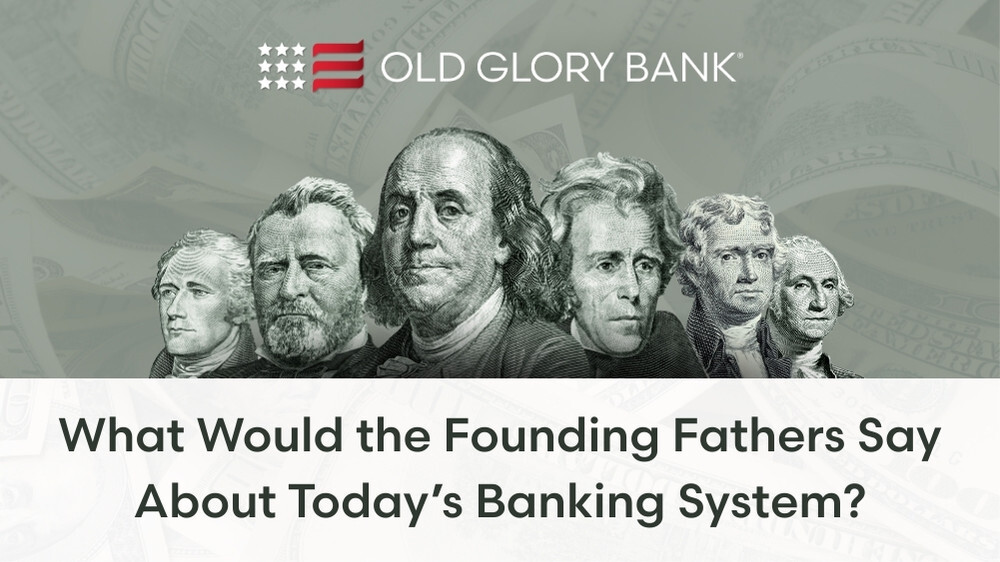When America declared its independence in 1776, it wasn’t just about cutting ties with a monarch. It was about building a nation rooted in liberty.
The Founding Fathers weren’t interested in simply escaping tyranny. They envisioned something better. They believed in a country where citizens could speak freely, worship openly, and live without fear of government interference. They understood that true liberty extended to how people earned, saved, and spent their money.
At Old Glory Bank, we believe that kind of freedom still matters. Especially now.
Back then, freedom meant risking everything – your land, your life, your legacy – just to say, “We decide.” Today, freedom means asking harder questions about the institutions we trust every day. It means looking at your bank and wondering: does this place protect what I believe in? Can I give to the causes I care about without being flagged or frozen? Is my money truly mine, or is it at the mercy of policies I never agreed to?
For many Americans, the answers are not comforting. They’re discovering that some banks are no longer neutral platforms. They’re not just holding your money. They’re monitoring it. When they don’t like where it goes or what it supports, they’re shutting it down. Debanking is a trending topic in the news and online – law-abiding citizens whose accounts have been shut down simply because the megabank that held it disagreed with their political views or the industry in which they worked (especially the industry that should be protected by our 2nd Amendment).
This isn’t what the Founding Fathers had in mind.
The men who built this nation believed in limited government, personal responsibility, and the right to live and think freely. James Madison warned about the dangers of centralized control.
Benjamin Franklin stood firm for free speech and association. Thomas Jefferson feared that debt and monopolized banking power could enslave a free people faster than any invading army.
If they walked into a megabank today and saw what’s happening, they wouldn’t recognize it. But if they walked into Old Glory Bank, they just might.
We built this bank on the very ideals they fought for: freedom, fairness, and financial independence. Our co-founders saw the growing trend of debanking, now revealed to be the result of political pressure from the highest level. They saw the government overreaching its limit of power and influence, and spying on the lawful spending of its own citizens.
Old Glory Bank was founded to fight this overreach, and we are still fighting today. We stand firm on our commitment to never shut down accounts based on ideology. That’s what makes Old Glory Bank different. We don’t think banking should be complicated or political. It should be personal. Honest. Secure. Free from surveillance and coercion. It should reflect the same values this country was founded on, not betray them.
This September, as we mark American Founders Month, it’s a good time to ask yourself a simple question: does your bank reflect your values, or someone else’s? Does your bank have your back, or bend to political pressure to push you out? Because if your bank punishes patriotism, silences opinions, or treats faith as a liability, then maybe it’s time for a change.
At Old Glory Bank, we’re not claiming to be revolutionary, but in some ways, we are. We believe that every deposit made, every account opened, and every transaction processed is more than a financial move. It’s a quiet declaration. A stand. A signal that liberty still matters, and that cancel culture doesn’t get to touch your wallet.
You don’t have to be a politician or a pundit to take a stand for freedom. Sometimes, it’s as simple as where you choose to bank. If Jefferson were alive today, we believe he’d bank with us. If Franklin saw what we were building, he’d probably print pamphlets about it. If Adams were watching, he’d likely tip his hat.
In 1776, the revolution started with muskets and manifestos. In 2025, it continues with something less tangible, but just as meaningful:
Your money. Your values. Your voice.
At Old Glory Bank, liberty still has a home. Join us in Old Glory Nation.
We stand with you.
Want more info about Old Glory Bank?

